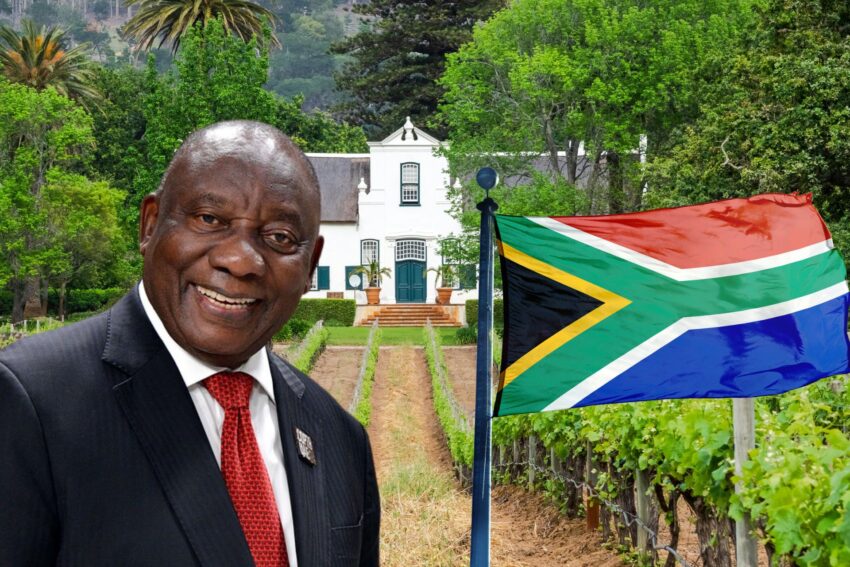In a bold move that has reignited debates on land rights and racial politics, U.S. President Donald Trump has announced the cessation of all financial aid to South Africa. This decision comes in response to South Africa’s recent legislative move to allow land expropriation without compensation — a policy aimed at redressing historical land disparities but criticized for potentially targeting specific racial groups – implicitly the White farming community.
Land Expropriation Without Compensation
Last month, South African President Cyril Ramaphosa signed into law an “Expropriation Act” which has been interpreted by some as enabling the government to seize land, particularly from White landowners, without offering any compensation. This act is seen by critics as a modern form of land theft, evoking comparisons to historical injustices. The government, however, frames this as a necessary step towards rectifying the skewed land ownership patterns inherited from the apartheid era, where a significant portion of the land remains in the hands of the White minority, despite them being a small fraction of the population.
The Plight of White Farmers
The backdrop to this political maneuver includes a disturbing trend of increased violence against White farmers. Reports have surfaced of these farmers facing not only the threat of land seizures but also physical attacks, which some claim are politically motivated. While crime rates are high across South Africa, affecting all communities, the narrative around White farmers has been particularly charged, with claims of targeted victimization. The government denies these claims, but large political rallies are held where participants are encouraged to sing about killing Boers and farmers (White people), with no repercussions for their genocidal advocacy.
If you are white, you are labelled a racist if you stand up for your own people.
This fooker sweeps up thousands of supporters every weekend singing :
“Shoot to kIll, kIll the boer, the farmer, prrr phaa, prrr phaa”
and it’s ok?! Welcome to #SouthAfrica pic.twitter.com/WabvEDnDGa
— Boer (@twatterbaas) March 3, 2024
Show me any other country where their food producers are attacked and murdered like this.
Show me any other country where they chant "Kill the Boer, kill the farmer"
The singing of "Kill the Boer" must be criminalised, and farm attacks must be declared a priority crime. https://t.co/U6bRcPX1Lj pic.twitter.com/GAyrXVLlX6— AgentLeon (@AgentLeonV3) January 16, 2025
This situation has stoked fears reminiscent of the land reforms in Zimbabwe under Robert Mugabe, where land was forcibly taken from White farmers in the early 2000s, leading to a dramatic decline in agricultural productivity and subsequent famine.
The Zimbabwean Precedent
Zimbabwe’s experience with land reform in the early 2000s serves as a stark warning. Following the violent land seizures, the country plunged into an economic crisis, with food production plummeting. The once-prosperous agricultural sector collapsed, leading to widespread hunger. In the years that followed, Zimbabwe found itself in the ironic position of inviting back the White farmers it had previously expelled, acknowledging their expertise was crucial for the nation’s agricultural recovery. This historical parallel is not lost on observers of South Africa’s current policy trajectory, raising concerns about potential economic fallout should similar methods be employed.
Trump’s Stance
Trump’s decision to cut aid was announced on his social media platform, Truth Social, where he spoke of “certain classes of people” being treated “very badly” in South Africa. Although not explicitly naming the White population, the context suggests he refers to them, particularly White farmers. The U.S. aid, notably through PEPFAR (President’s Emergency Plan for AIDS Relief), was a significant part of South Africa’s fight against HIV/AIDS, and its withdrawal could have broader implications beyond land policy.
International and Domestic Reactions
Internationally, reactions have been mixed. Some view Trump’s action as an overreach, while others see it as standing up for property rights and human rights. Domestically in South Africa, the policy has deepened rifts, with critics of the government accusing it of fostering racial division, while supporters argue it’s essential for true economic empowerment of the black majority.
Looking Forward
The implications of these developments are far-reaching. Economically, South Africa risks alienating investors wary of property rights instability. Socially, the policy could exacerbate racial tensions, particularly if the narrative of victimization against White farmers gains traction. Politically, Trump’s aid cut has placed South Africa in a delicate position, potentially affecting its international relations and domestic policy adjustments.
As South Africa navigates this contentious issue, the world watches closely. The balance between dealing with historical grievances and ensuring economic stability and social harmony remains a complex challenge, with the lessons from Zimbabwe serving as a cautionary tale. Whether South Africa can chart a different course from its northern neighbor will be a defining test for its current leadership.


